| Listing 1 - 10 of 17 | << page >> |
Sort by
|
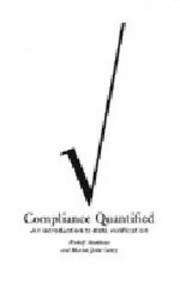
ISBN: 0511526512 0521553660 0521019192 Year: 1996 Publisher: Cambridge : Cambridge University Press,
Abstract | Keywords | Export | Availability | Bookmark
 Loading...
Loading...Choose an application
- Reference Manager
- EndNote
- RefWorks (Direct export to RefWorks)
International agreements, such as those governing arms control or the environment, virtually always require some degree of verification of information, in order that compliance can be established. To ensure that the verification process can be regarded as efficient, effective and impartial, it is important to have a mathematical model of it. One can be derived by applying methods from statistics and the theory of non-cooperative games, developed in part by John Nash, who received a Nobel prize in 1994 for his work. The methods permit the development of rational verification strategies, as well as such fundamental concepts as guaranteed probability of detection, timeliness of inspections and the deterrence of illegal activity. In this 1996 book, the required theory is introduced gradually in the context of specific real-world examples. The only prerequisites are simple calculus and statistics, so the book should be accessible to a broad range of scientists and non-scientists, in industrial, academic or governmental environments.
Arms control --- Security, International --- Arms race --- Disarmament --- Military readiness --- Verification --- Mathematical models. --- Mathematical Sciences --- Probability
Book
ISBN: 0920231225 Year: 1996 Publisher: Toronto Centre for international and security studies
Abstract | Keywords | Export | Availability | Bookmark
 Loading...
Loading...Choose an application
- Reference Manager
- EndNote
- RefWorks (Direct export to RefWorks)
ARMS CONTROL AND DISARMAMENT--VERIFICATION --- Arms control --- Disarmament --- Nuclear nonproliferation --- Security, International --- Arms race --- Military readiness --- Verification
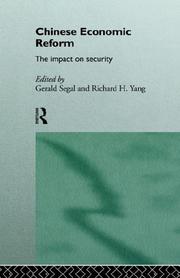
ISBN: 0415130077 Year: 1996 Publisher: London : Routledge,
Abstract | Keywords | Export | Availability | Bookmark
 Loading...
Loading...Choose an application
- Reference Manager
- EndNote
- RefWorks (Direct export to RefWorks)
Defense industries --- Military readiness --- National security --- Industrie militaire --- Armements --- Sécurite nationale --- Economic aspects --- Aspect économique --- China. --- China --- Chine --- Economic policy --- Foreign relations --- Politique économique --- Relations extérieures --- Sécurite nationale --- Aspect économique --- Politique économique --- Relations extérieures
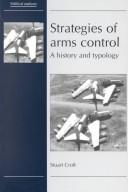
ISBN: 0719048788 071904877X 9780719048777 9780719048784 Year: 1996 Publisher: Manchester ; New York Manchester University Press
Abstract | Keywords | Export | Availability | Bookmark
 Loading...
Loading...Choose an application
- Reference Manager
- EndNote
- RefWorks (Direct export to RefWorks)
Arms control --- Arms control. --- Security, International. --- Political aspects. --- ontwapening --- 873 Wapenbeheersing --- Security, International --- 874.1 Regelgeving en controle --- Collective security --- International security --- International relations --- Disarmament --- International organization --- Peace --- Arms race --- Military readiness --- Political aspects --- Polemology
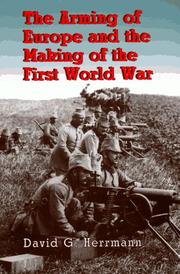
ISBN: 0691033749 0691201382 9780691033747 9780691201382 0691015953 Year: 1996 Publisher: Princeton, N.J. Princeton University Press
Abstract | Keywords | Export | Availability | Bookmark
 Loading...
Loading...Choose an application
- Reference Manager
- EndNote
- RefWorks (Direct export to RefWorks)
David Herrmann's work is the most complete study to date of how land-based military power influenced international affairs during the series of diplomatic crises that led up to the First World War. Instead of emphasizing the naval arms race, which has been extensively studied before, Herrmann draws on documentary research in military and state archives in Germany, France, Austria, England, and Italy to show the previously unexplored effects of changes in the strength of the European armies during this period. Herrmann's work provides not only a contribution to debates about the causes of the war but also an account of how the European armies adopted the new weaponry of the twentieth century in the decade before 1914, including quick-firing artillery, machine guns, motor transport, and aircraft. In a narrative account that runs from the beginning of a series of international crises in 1904 until the outbreak of the war, Herrmann points to changes in the balance of military power to explain why the war began in 1914, instead of at some other time. Russia was incapable of waging a European war in the aftermath of its defeat at the hands of Japan in 1904-5, but in 1912, when Russia appeared to be regaining its capacity to fight, an unprecedented land-armaments race began. Consequently, when the July crisis of 1914 developed, the atmosphere of military competition made war a far more likely outcome than it would have been a decade earlier.
World War, 1914-1918 --- Arms race --- Military readiness --- Première guerre mondiale --- Course aux armements --- Armements --- Causes. --- Causes --- Première guerre mondiale --- Europe --- Arms race - Europe. --- Military readiness - Europe. --- Military readiness. --- War --- Arms proliferation --- Proliferation of arms --- Security, International --- Arms control --- Arms transfers --- Disarmament --- Armaments --- Defense readiness --- Defenses, National --- Military preparedness --- National defenses --- Preparedness (Military science) --- Readiness (Military science) --- Military policy --- Manpower --- Causes of war --- Council of Europe countries --- Eastern Hemisphere --- Eurasia --- Aehrenthal, Alois Lexa von. --- Algeciras conference. --- Austro-Hungarian. --- Belgium. --- European war. --- Franco-Russian Alliance. --- Hafid. --- Haldane, Richard Burdon. --- Italian-Turkish War. --- Krupp steelworks. --- Mogador. --- Ottoman Empire. --- Schneider-Creusot industries. --- Triple Entente. --- Verdun. --- Zipfel. --- antimilitarism. --- cavalry. --- machine guns. --- predictions of. --- quick-firing artillery. --- rifles. --- taxation. --- war plans.
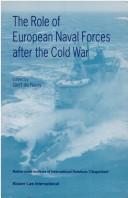
ISBN: 9041102272 Year: 1996 Volume: 21 Publisher: The Hague ; London ; Boston Kluwer Law International
Abstract | Keywords | Export | Availability | Bookmark
 Loading...
Loading...Choose an application
- Reference Manager
- EndNote
- RefWorks (Direct export to RefWorks)
821 Internationaal Recht --- 822.1 Verenigde Naties --- 822.5 Europese Unie --- 822.6 Militaire Bondgenootschappen --- 828 Geografie --- 830 Economie --- 876 Veiligheidspolitiek --- 876.1 Defensie --- 884 Europa --- National security --- Sea-power --- Dominion of the sea --- Military power --- Naval policy --- Navy --- Sea, Dominion of the --- Seapower --- Military readiness --- Naval art and science --- Naval history --- Naval strategy --- Navies --- Europe --- Sea power --- Sea-power - Europe.
Book
ISBN: 066225029X Year: 1996 Publisher: Ottawa Department of Foreign Affairs and International Trade,
Abstract | Keywords | Export | Availability | Bookmark
 Loading...
Loading...Choose an application
- Reference Manager
- EndNote
- RefWorks (Direct export to RefWorks)
Confidence and security building measures (International relations) --- Arms control. --- Security, International. --- Mesures de confiance et de securite (Relations internationales) --- Armements --- Securite internationale. --- #SBIB:327.5H22 --- Collective security --- International security --- International relations --- Disarmament --- International organization --- Peace --- Security, International --- Arms race --- Military readiness --- CBMs (International relations) --- Confidence building measures (International relations) --- CSBMs (International relations) --- Arms control --- International relationsControle. --- Ontwapeningsproblemen - bewapening --- Controle.
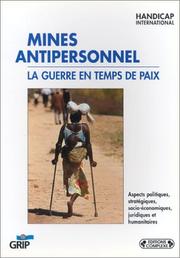
ISBN: 2870276559 9782870276556 Year: 1996 Volume: 213 Publisher: Bruxelles: GRIP-Complexe,
Abstract | Keywords | Export | Availability | Bookmark
 Loading...
Loading...Choose an application
- Reference Manager
- EndNote
- RefWorks (Direct export to RefWorks)
wapenhandel --- Polemology --- ontwapening --- Armes --- Booby traps (Military science) --- Mijnen (Militaire explosieven) --- Military mines --- Mine planting --- Mines (Explosifs militaires) --- Mines (Military explosives) --- Mines [Military ] --- Wapens --- Mines antipersonnel --- Political aspects --- Social aspects --- Economic aspects --- Aspect politique --- Aspect social --- Aspect économique --- Arms control. --- Land mines. --- Land mines (International law) --- Arms control --- Land mines --- 662.1/.4 --- International law --- Landmines --- Security, International --- Arms race --- Disarmament --- Military readiness --- Land mines (International law). --- Aspect économique
Book
ISBN: 2738103774 9782738103772 Year: 1996 Publisher: Paris: Odile Jacob,
Abstract | Keywords | Export | Availability | Bookmark
 Loading...
Loading...Choose an application
- Reference Manager
- EndNote
- RefWorks (Direct export to RefWorks)
Geopolitics --- Geopolitiek --- Géopolitique --- Oceanografie en Staat --- Oceanographie et Etat --- Oceanography and state --- State and oceanography --- Marine resources and state --- Maritime law --- Sea power --- Shipping --- Ressources marines --- Droit maritime --- Transports maritimes --- Government policy --- Politique gouvernementale --- Ocean --- Sea-power --- 822.5 Europese Unie --- 827 Geopolitiek --- 838.1 Ecologie --- 839 Technologie en infrastructuur --- 844.4 Mobiliteit --- 872 Massavernietigingswapens --- 880 Regios en landen --- 884.4 West-Europa --- Marine resources --- Government policy. --- Sea-power. --- Dominion of the sea --- Military power --- Naval policy --- Navy --- Sea, Dominion of the --- Seapower --- Military readiness --- Naval art and science --- Naval history --- Naval strategy --- Navies --- Oceans --- Sea, The --- Bodies of water --- Oceanography --- World politics --- Foreign relations
Book
Abstract | Keywords | Export | Availability | Bookmark
 Loading...
Loading...Choose an application
- Reference Manager
- EndNote
- RefWorks (Direct export to RefWorks)
Disarmament --- Désarmement --- Ontwapening --- Conflict management --- Arms control --- 341.67 <679> --- 967.9 --- -Conflict management --- -341.67 <679> --- Conflict control --- Conflict resolution --- Dispute settlement --- Management of conflict --- Managing conflict --- Management --- Negotiation --- Problem solving --- Social conflict --- Crisis management --- Security, International --- Arms race --- Military readiness --- Ontwapening. Beperking ,vermindering van bewapening. Salt akkoorden. ABC akkoorden. Non-proliferatieverdragen. Oorlogspreventie--Mozambique --- Geschiedenis van Mozambique --- Mozambique --- Politics and government --- -History --- Military readinessOntwapening. Beperking ,vermindering van bewapening. Salt akkoorden. ABC akkoorden. Non-proliferatieverdragen. Oorlogspreventie--Mozambique --- Geschiedenis van MozambiqueMozambique --- MozambiquePolitics and government --- 967.9 Geschiedenis van Mozambique --- 341.67 <679> Ontwapening. Beperking ,vermindering van bewapening. Salt akkoorden. ABC akkoorden. Non-proliferatieverdragen. Oorlogspreventie--Mozambique --- -Arms control --- República de Moçambique --- República Popular de Moçambique --- Moçambique --- Mo-san-pi-kʻo --- People's Republic of Mozambique --- Mozambik --- Narodnai︠a︡ Respublika Mozambik --- NRM (Mozambique) --- NR Mozambik --- State of Mozambique --- Mosambiek --- Mosambik --- Volksrepublik Mosambik --- Msumbiji --- Província de Moçambique (Portugal) --- Province de Mozambique (Portugal) --- Colónia de Moçambique (Portugal) --- Mozambico --- Portuguese East Africa --- History --- Peace. --- United Nations --- Conflict management - Mozambique. --- Arms control - Mozambique.
| Listing 1 - 10 of 17 | << page >> |
Sort by
|

 Search
Search Feedback
Feedback About UniCat
About UniCat  Help
Help News
News